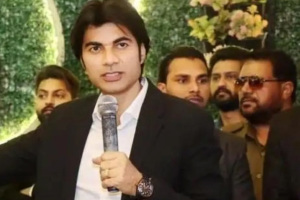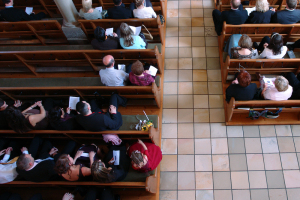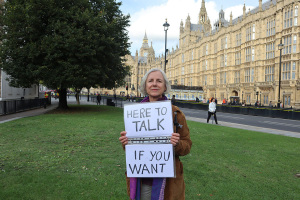Q&A: Gabe Lyons Talks Christians in a Resistant Culture
Gabe Lyons wants to help Christians understand what's happening in the culture today, namely that being a Christian no longer draws the respect and acceptance it once did in America. Christians have, in fact, become somewhat of a "repellant" to a lot of people today, he said.
"We are almost starting over in a lot of ways in presenting what it means to be a Christian in a culture that's got more options than ever and is kind of resistant to Christians," said the author of The Next Christians: Seven Ways You Can Live the Gospel and Restore the World.
The Next Christians is being released on paperback and contains new content including a chapter on being civil rather than divisive.
Lyons talked with The Christian Post on Wednesday about the updated book and the upcoming Q Conference, which he founded in 2007.
The following are excerpts from the interview:
CP: This is a re-release of the book. Why re-release it and what is different about the paperback edition compared to the original hardback?
Lyons: We didn't want to just convert the original into paperback. We thought over the last year and a half of our conversations we've had with those who are engaging with the book and reading the book, and finding it to give them a new perspective and that a ton of readers are actually reading this, and church leaders and staffs and leaders of organizations trying to understand what's happening next and almost from an observant point of view.
This book is for everybody, it's not just for younger generation, it's not just for pastors. This is for any Christian who is trying to really understand what's happening in our culture today.
This book was written for every Christian. Every Christian who is living in the 21st century in 2012 and trying to be faithful in a culture that has become much more pluralistic, much less respectful of Christians. So in that sense re-releasing the book we changed a few things. I added a new chapter to deal specifically with one of the topics that was not in the previous one. One of the characteristics I describe of a Restorer or a Next Christian that they are civil instead of divisive. There's a whole chapter on that. And I also added an author's note at the beginning that describes more of the heart behind the project.
CP: You write in the book that "Christian America" is dead. What do you define as "Christian America" and why do you consider it no more?
Lyons: When I described "Christian America," the simple definition was a public square that really relied on Judeo-Christian ideas governing it – where everybody agreed on what was right and wrong, what was moral, what was immoral, what was good, what was bad. There was just this common sense that we were all on the same page as citizens in our country and in the public square where conversations are taking place.
The thought of being a Christian years ago was something that was very respected that today being a Christian has several perceptions that follow it as a brand really.
Most people think of Christians today as judgmental, too political, only interested in proselytizing them. So if you are a Christian today and you are wearing that reputation, it's a repellant to a lot of people to even consider not only friendship with you but also the grace that drives much of your life. And so to talk about the end of "Christian America" is to say America has moved to a place where every faith has a seat at the table. It's more pluralistic than ever and we're in a place where you can't rely on some of these old traditional ideas that people just assumed.
We are almost starting over in a lot of ways in presenting what it means to be a Christian in a culture that's got more options than ever and is kind of resistant to Christians.
CP: You describe "Restorer Christians" as a big movement in America. Is it possible that this movement could revive "Christian America"?
Lyons: I think whether it could revive "Christian America," I am not sure that is the point, because I think the Restorer mindset is not bent on creating a nation necessarily that functions under a certain religious point of view. It's more about meeting individuals where they're at, figuring out what's broken in their life, being a support to that, helping them find resolution, helping them hopefully find Jesus.
What we see is an America that is not so cynical, not so skeptical; an America that is optimistic and hopeful because of many of its citizens that have really good thinking about what makes a great society function and how we think about others who are different than us. Compassion, working together, working in civil ways towards the common goals, working with people of other faiths.
CP: The way you describe "Restoration Christianity," with historical and biblical examples, makes it sound like this movement is a cyclical occurrence in history. Is this the case and if so how does the church stop the cycle and remain in a "Restorer" mentality?
Lyons: The cycle that we see is that every 500 years, Phyllis Tickle writes about this in her book, you see the church has gone through significant changes such as the Great Schism of the churches, the Reformation 500 years ago takes place that creates the Protestant Movement.
And really, as history would say, we're in the middle of a moment where what we think is changing and we're due for something new. And so what I am pointing to is that what we're seeing take place amongst the younger generation of Christians, [they] have had to really pioneer and lead in the new environment.
As long as the church can continually come back to [Jesus'] example, yes I think it's possible that we won't go through as many cycles but also because cultures change and because society is constantly advancing and constantly becoming new I think it's also safe to say that a few hundred years from now things will look so different that we'll constantly be adjusting and need to be adjusting how the Gospel shows up and relates to people.
CP: Regarding this year's Q Conference, what has been the most exciting thing or things regarding the preparation for this year's conference?
Lyons: We're excited to just be hosting it in the middle of a presidential election year in Washington, D.C. To really talk about what the common good looks like, how do we find the common good, how do we work together with people who we have differences with, that we need to find common ground with.
We are going to hit so many different things and it will be fun to be doing that right at the heart of our nation's capital.
CP: Past Q Conferences have included speakers like Imam Feisal Abdul Rauf, the New York Muslim leader at the center of the "Ground Zero Mosque" controversy and Sam Adams, the openly gay mayor of Portland, Ore. How do you convince public figures like these to speak at the Q Conference?
Lyons: When we reach out to those leaders we simply let them know that we're gathering 600, 700 speakers from around the country, around the world – thoughtful Christians who are interested in engaging in their communities and in their cities and being a part of advancing the common good. And that means we could learn from anybody. We could learn from people who are trying to engage in their cities and we need to be educated.
Imam Feisal, when I interviewed him it was because one of the big discussions occurring, of the current cultural zeitgeists is what … the relationship between Christians and Muslims should be like.





























